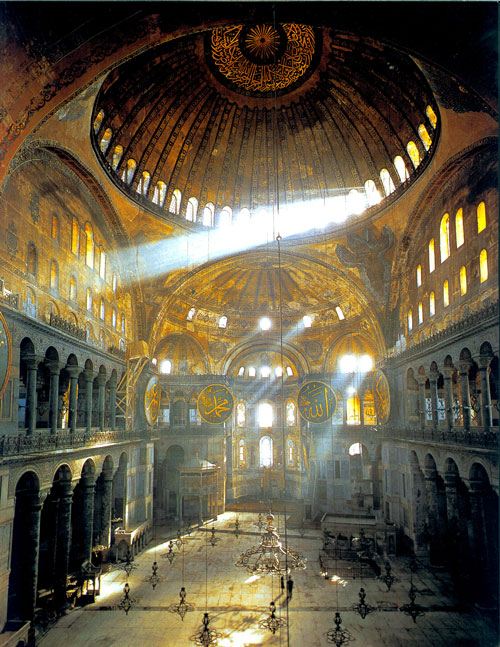Wikipedia:
Hagia Sophia is a former Greek Orthodox patriarchal basilica (church), later an imperial mosque, and now a museum in Istanbul, Turkey. From the date of its construction in 537 until 1453, it served as an Eastern Orthodox cathedral and seat of the Patriarchate of Constantinople,[1] except between 1204 and 1261, when it was converted to a Roman Catholic cathedral under the Latin Empire. The building was a mosque from 29 May 1453 until 1931. It was then secularized and opened as a museum on 1 February 1935.An excerpt from, "Hagia Sophia caught between politics, history" by Maurice Kodeih, Al Monitor, June 8, 2014:
During these days, the anniversary of the fall of Constantinople — the date that was set by Turkish Prime Minister Recep Tayyip Erdogan to reconvert the Hagia Sophia into a mosque — coincides with a call to the leaders of Islamic countries to pray there.An excerpt from, "Could Erdogan open Hagia Sophia to prayer as part of electoral plan?" by Omer Sahin, Al Monitor, February 25, 2014:
The Hagia Sophia — this great building — was a church for more than 1,000 years, and was the seat of the Ecumenical Patriarchate during that period, except under the Latin occupation of Constantinople (1204-1261) when the seat was moved to Nicaea. This was before the Ottoman Sultan Mehmet II (known as Mehmet the Conqueror) turned it into a mosque in 1453 after he took control and occupied the city. The Hagia Sophia remained a mosque until 1935, when the founder of modern Turkey decided to offer it as “a gift to mankind” by converting it into a museum.
It could be easy to override the official procedures and open the Hagia Sophia to Muslim worship, but there is the issue of possible reactions from the Western world. The Hagia Sophia has different connotations for the West, while it is seen as the symbol of conquest by most Turks. There are Christian icons and mosaics inside the Hagia Sophia. There is also the question of what will happen to the Christian texts should Hagia Sophia be opened to worship in its entirety. There have been some suggestions of benefiting from technology to create “light screens.”An excerpt from, "Muslims pray to turn Turkey's greatest monument back into a mosque" by Ayla Jean Yackley, Reuters, May 30, 2014:
A pledge to make Hagia Sophia a mosque may draw some disaffected nationalist and religious voters back to Erdogan in the presidential vote after a year of anti-government protests and a corruption scandal, said Sahin Alpay, a professor of political science at Bahcesehir University and a columnist for the Zaman daily. But he argued it would not be worth the price.An excerpt from, "Erdogan Answers to Muslims on Hagia Sophia" by Nikoleta Kalmouki, Greek Reporter, June 8, 2014:
"It would strengthen the mutual suspicion and polarisation between the West and the Muslim world," Alpay said. "All hell breaking loose is a high price to pay."
The U.S. Commission on International Religious Freedom, a bi-partisan advisory panel set up by Congress, said in a statement last week that such a move would threaten Turkey's international standing and recall its mistreatment of Christians over the last century.
"Whether driven by political considerations tied to Turkey's forthcoming elections, or for any other reason, opening Hagia Sophia as a mosque would clearly be a divisive and provocative move," it said, calling on Erdogan to affirm its current status.
Ecumenical Patriarch Bartholomew, spiritual leader of 300 million Orthodox Christians worldwide, has called for Hagia Sophia to stay a museum.
“Let’s see if we can fill up the Blue Mosque first, before Hagia Sophia,” stated the Turkish Prime Minister Recep Tayyip Erdogan, giving a diplomatic answer to those who want to see the conversion of Hagia Sophia into a mosque.Video Title: Obama visits Hagia Sofia Church. Source: AFP. Date Published: April 7, 2009.
Istanbul, Turkey: Hagia Sophia. Source: Rick Steves. Date Published: July 25, 2012.
